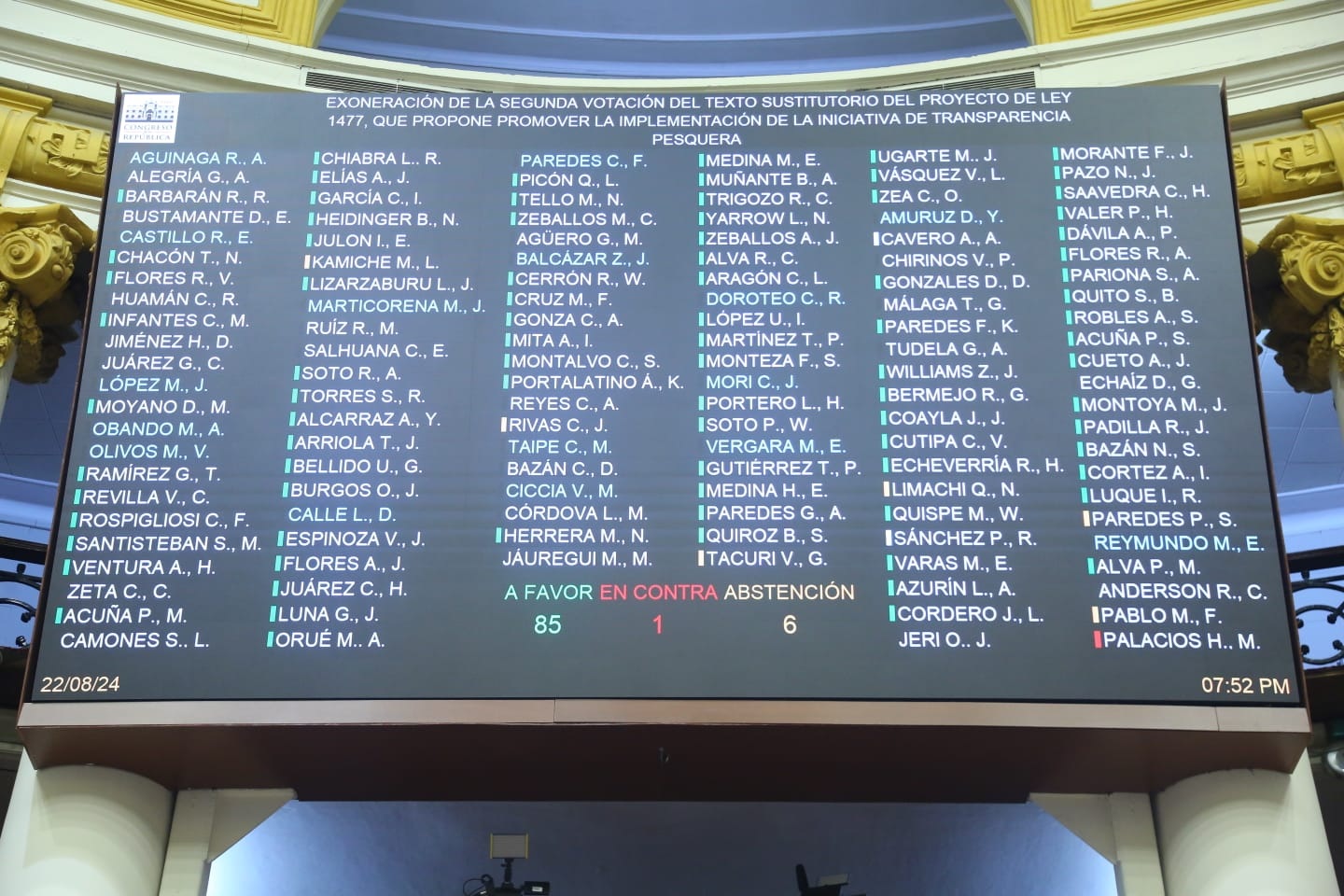Peru strengthens its global leadership by promoting the FiTI

Peru has taken a decisive step to consolidate its position as a global leader in the fisheries sector with the recent approval of Bill 1477/2021-CR by the Congress, which promotes the implementation of the Fisheries Transparency Initiative (FiTI). The approval of this bill on August 22, with 87 votes in favor, 1 against, and 6 abstentions, marks a significant milestone for the Peruvian fisheries sector.
The Fisheries Transparency Initiative (FiTI) supports coastal countries in implementing the FiTI Standard, which defines what fisheries management information should be published online by governments. For example, this includes publishing scientific assessments of fish stocks and sector regulations in a comprehensible and accessible manner for various audiences.
In this context, Peru would become the third country in the region, along with Chile and Ecuador, to commit to implementing the FiTI Standard, and the first to do so through legislation. “In this way, the country sends a clear message to the world: Peru is committed to the highest international transparency standards in managing its fisheries resources,” said Nicolás Rovegno, FiTI Regional Coordinator for Latin America. He also emphasised that, “Peru is a global fishing power, and with this law, it reaffirms its leadership not only in volume but also in responsibility and transparency.”
In Peru, the implementation of the FiTI Standard will reinforce its commitment to fisheries sustainability and strengthen its credibility both nationally and internationally. This initiative directly contributes to achieving Sustainable Development Goal 14 (SDG 14), which seeks to “conserve and sustainably use the oceans, seas, and marine resources for sustainable development.” FiTI aligns with national policies and strategies that promote ethics, citizen participation, open government, and digital transformation in public management, and it is closely linked to Peru’s process of joining the Organisation for Economic Co-operation and Development (OECD), consolidating its position as a leader in the sustainable management of marine resources.
Transparency in the fisheries sector ensures that citizens have the right and the opportunity to access the information that supports fisheries management decisions, guaranteeing that these decisions are based on the best scientific evidence. In this context, it is essential that information is accessible to all sector actors, including artisanal fishing communities that play a crucial role in the country’s economy. Mario Fiestas, Manager of the San José Limited Artisanal Fishing Cooperative, stated: “For us, it is essential that information reaches fishers and is understandable. This will allow us to stay informed, understand sector regulations, and act responsibly. It is also important to highlight our contribution as generators of employment and food security for the country.”
“This law is a significant advance because it ensures that all actors in the sector, including artisanal fishers, have access to the necessary information to participate in fisheries management decisions, ensuring their sustainability and livelihoods,” added Milagros Mitma, Public Management Leader of WWF Peru’s Pacific Landscape.
Furthermore, in a global environment where markets are increasingly demanding sustainability, having a robust standard like FiTI could open new trade opportunities and strengthen Peru’s reputation as a reliable supplier of sustainable fishery products. The implementation of FiTI could facilitate access to high-value markets and contribute to the certification processes for sustainable fisheries, such as the Marine Stewardship Council (MSC) Standard. Since some of the thematic areas of the FiTI Standard are aligned with MSC requirements, compliance with one could facilitate compliance with the other, further strengthening the credibility and sustainability of Peru’s fisheries sector.
In this regard, Alfonso Miranda, President of the Fisheries and Aquaculture Committee of the National Society of Industries (SNI), noted: “This law not only reaffirms our position as leaders in production but also sends a strong message to international markets about our commitment to sustainable fishing practices, which is essential for maintaining and expanding our access to high-value markets.”
The next step is for the Executive to enact the law. Subsequently, the Ministry of Production (PRODUCE) will need to establish a National Multi-Stakeholder Group and develop a participatory work plan. This approach is crucial for achieving significant improvements in transparency, ensuring that key fisheries information is accessible to all stakeholders in the sector, and contributing to greater sustainability of the industry.
A version of this article first appeared on the WWF Peru website.
Image by Oficina de Comunicaciones e Imagen Institucional, Congreso de la República del Perú.